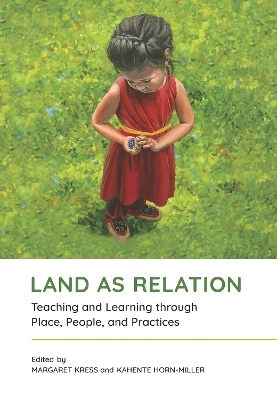
Land as Relation
Canadian Scholars (Verlag)
978-1-77338-339-2 (ISBN)
Land as Relation demonstrates that Indigenous resistance and renaissance is essential for learners everywhere to understand how a collective notion of land education contributes to walking in harmony and balance, not only for themselves, but for their families, the larger communities that they are a part of, and the world. This collection is an accessible and engaging core resource for undergraduate and graduate students of education, Indigenous studies, geography, and environmental studies.
Dr. Margaret Kress originates from the south grasslands in Treaty Four territory and the Métis homelands. She carries the name Tahkwaki Waapikwani Iskwew (Bear Clan). She is an Adjunct Professor at the University of New Brunswick. Dr. Kahente Horn-Miller is Akskare:wake (Bear Clan) from the Kanienkehaka community of Kahnawake. She is an Associate Professor in the school of Indigenous and Canadian Studies and holds the inaugural role of Assistant Vice President Indigenous Teaching, Learning and Research at Carleton University.
AcknowledgementsIntroduction: Land as Relation: Teaching and Learning through Place, People and Practices
Part I: Embodying Place
Chapter 1: Tsi ni sti wen ah: Making it Alive in the Mind (Through a Conversation with Floyd Favel)
Chapter 2: Finding Sustainability in Indigenous Traditional Wisdom: A Methodology for Architecture and Land Use Planning
Chapter 3: Nahayow/Ininew Aski-Nipi Pimatisiwin: Kayask, Anoch, Nikaanote Pimacihowin (Cree Family Stories of Land-Water Life: Past, Present and Future Livelihood)
Chapter 4: To Share is to Live
Chapter 5: Izena Badu, Bada - Celebrating Living Memory and Place in Euskal Erria
Chapter 6: Lands of the Caribou Peoples
Chapter 7: Land, Wind and Sea Stories: Embodying Isthmian Relationalities
Chapter 8: Métis Pedagogy in Land-Based Teaching and Learning
Chapter 9: Cuzco: The Sacred City of the Incas, its Roads and Festivals
Part II: Pedagogies of Land
Chapter 10: Listening to the Land: Honouring Ancestors
Chapter 11: Learning from Aki through Indigenous Activity-Based Practices
Chapter 12: Honouring Sámi Children's Agency through Land-Based Education
Chapter 13: A View from the River: the Kanyen'kehá:ka Place Naming Convention
Chapter 14: Reclaiming Wolastoqeyik Land-based Pedagogy in Waponahkik: The Intersection of Rights, Relationship, and Reconciliation
Chapter 15: The Pedagogy of Land in the Inuit Bachelor of Education Program
Chapter 16: "No, we own the forest like the child owns their mother": Mathematical Abstraction and Detachment in Land-Based Pedagogies
Chapter 17: Traditional Ecological Knowledge and Scientific Ecological Knowledge: Crossing the Ontological Divide
Chapter 18: Towards Indigenous Place-Based Metaphors for Environmental History Education
Part III: Spirit of the Land: Learning with Our Relations
Chapter 19: The Origins, Genealogy, and Meanings of Indigenous Storywork
Chapter 20: Out on the Land: Reflections
Chapter 21: Telling of Kaniatarowanenneh (St. Lawrence): Storying Akwesasronon Relationship with the River
Chapter 22: Oho Ake Hauiti! /Arise Hauiti!: Participation in the Traditional Arts as a Means of Strengthening Tribal Identity
Chapter 23: Stories from the Land
Chapter 24: Reconnecting with Spirit: Teachings from our Relatives and Earth
Chapter 25: Ma'jitamek: A Transformative Journey of Ceremony in Wabanaki Territory
Editor and Contributor Biographies
| Erscheinungsdatum | 02.09.2023 |
|---|---|
| Verlagsort | Toronto |
| Sprache | englisch |
| Maße | 171 x 248 mm |
| Gewicht | 272 g |
| Themenwelt | Sozialwissenschaften ► Ethnologie |
| Sozialwissenschaften ► Pädagogik ► Allgemeines / Lexika | |
| Sozialwissenschaften ► Pädagogik ► Bildungstheorie | |
| Sozialwissenschaften ► Soziologie | |
| ISBN-10 | 1-77338-339-6 / 1773383396 |
| ISBN-13 | 978-1-77338-339-2 / 9781773383392 |
| Zustand | Neuware |
| Haben Sie eine Frage zum Produkt? |
aus dem Bereich


